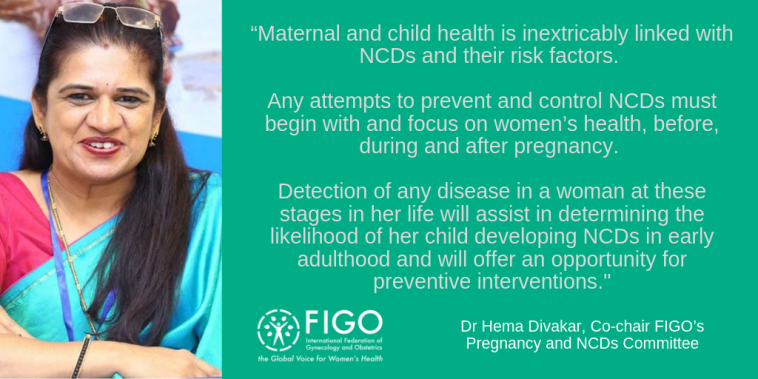A Global Health Tsunami: NCDs

FIGO was delighted to share our expertise on the health and rights of girls and women in the 21st century at the recent Women Deliver Conference in Vancouver.
A Global Health Tsunami: Non-communicable Diseases was one of three ground-breaking sessions we hosted in collaboration with HelpAge International and the NCD Alliance, bringing critical issues of women’s health to the world’s biggest gender equality conference.
|
Non-communicable diseases (NCDs) – namely cancer, cardiovascular disease, chronic respiratory disease, diabetes, and mental and neurological conditions – are responsible for 70 percent of all global mortality. While NCDs span a broad range of conditions - cancer, cardiovascular disease, chronic respiratory disease, diabetes, and mental and neurological conditions – there are many that target along gender lines. Cervical cancer, diabetes in pregnancy, mental health and neurological conditions, particularly dementia, are of specific interest to women and girls. As it stands, no single country is on track to achieve the SDG3.4 target to reduce by one third premature mortality from non-communicable diseases through prevention and treatment and promote mental health and well-being. Dr Hema Divakar, Co-chair FIGO’s Pregnancy and NCDs Committee, and Consultant ObGyn and Medical Director at Divakars Specialty Hospital in India, recently voted Global Asian of the Year 2018/19, is a long-time advocate for converting the challenges of NCDs and the intergenerational component, into opportunities. She joined this high profile-panel alongside HRH Princess Dina Mired (UICC), Dr Veronica Magar (WHO), Bruno Carrattini (NCD Child) and Karen Walker (The George Institute) to discuss the reproductive years of a woman’s life, focusing on the need for integrated care, including screening and treatment for common risk factors such as hypertension and hyperglycaemia. She also discussed the urgency of preventing the transmission of diseases from parents to their offspring, something FIGO is working hard to bring to the attention of the global health community. Dr Divakar comments:
Women and girls in low- and middle-income countries often face a framework of even greater inequity, as well as health outcomes shaped by gender norms. A triple burden of poor health resulting from reproductive and maternal health conditions, communicable diseases, and NCDs. Prenatal malnutrition and low birth weight can lead to obesity, high blood pressure, heart disease and other NCDs later in life. Maternal obesity and gestational diabetes are also associated with similar risks, both in the mother and her children Dr Divakar adds:
The integration of maternal and child health with NCD prevention is central to bold and practical recommendations on how to transform new opportunities to enable countries to accelerate progress towards SDG3.4. |